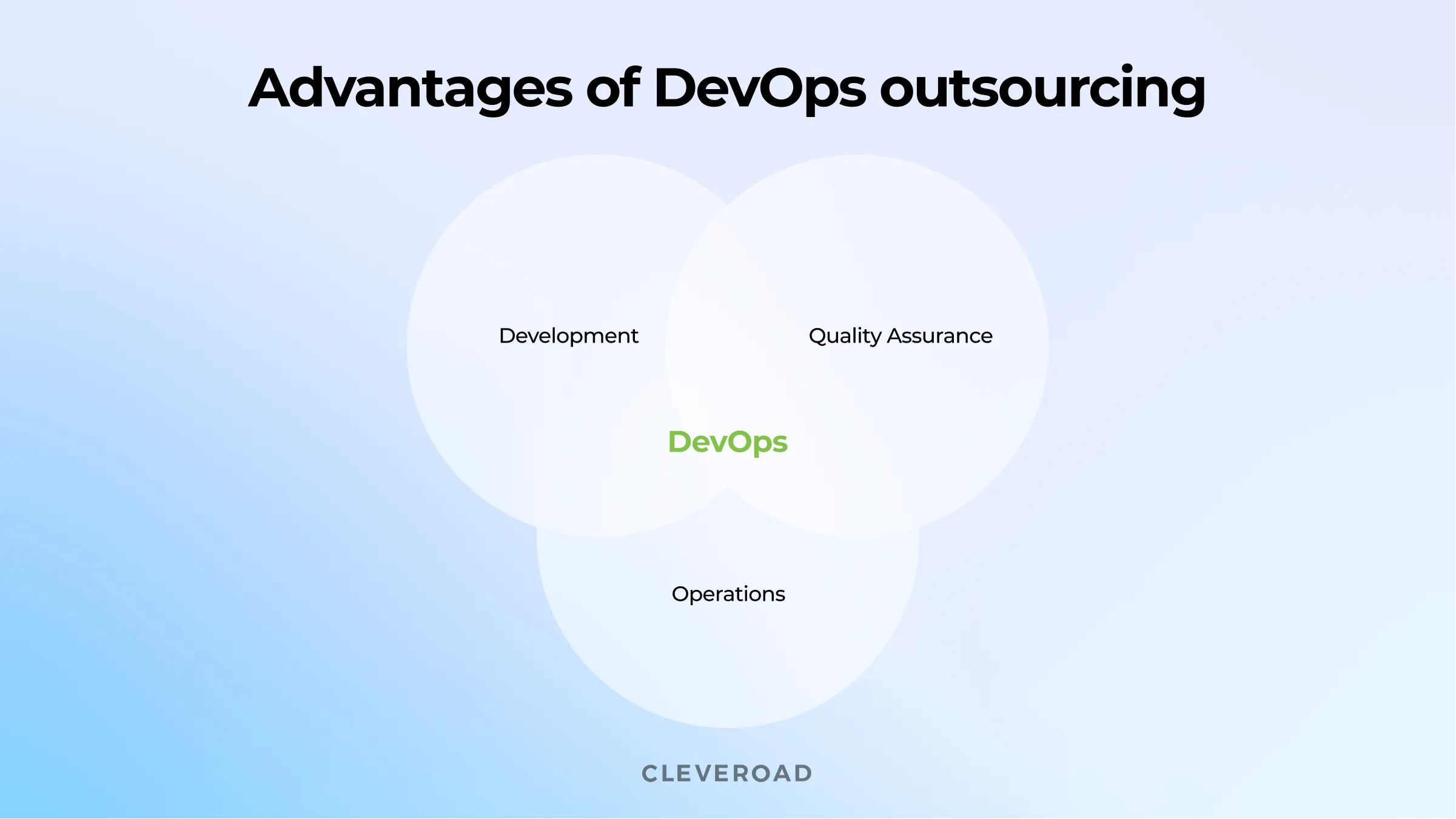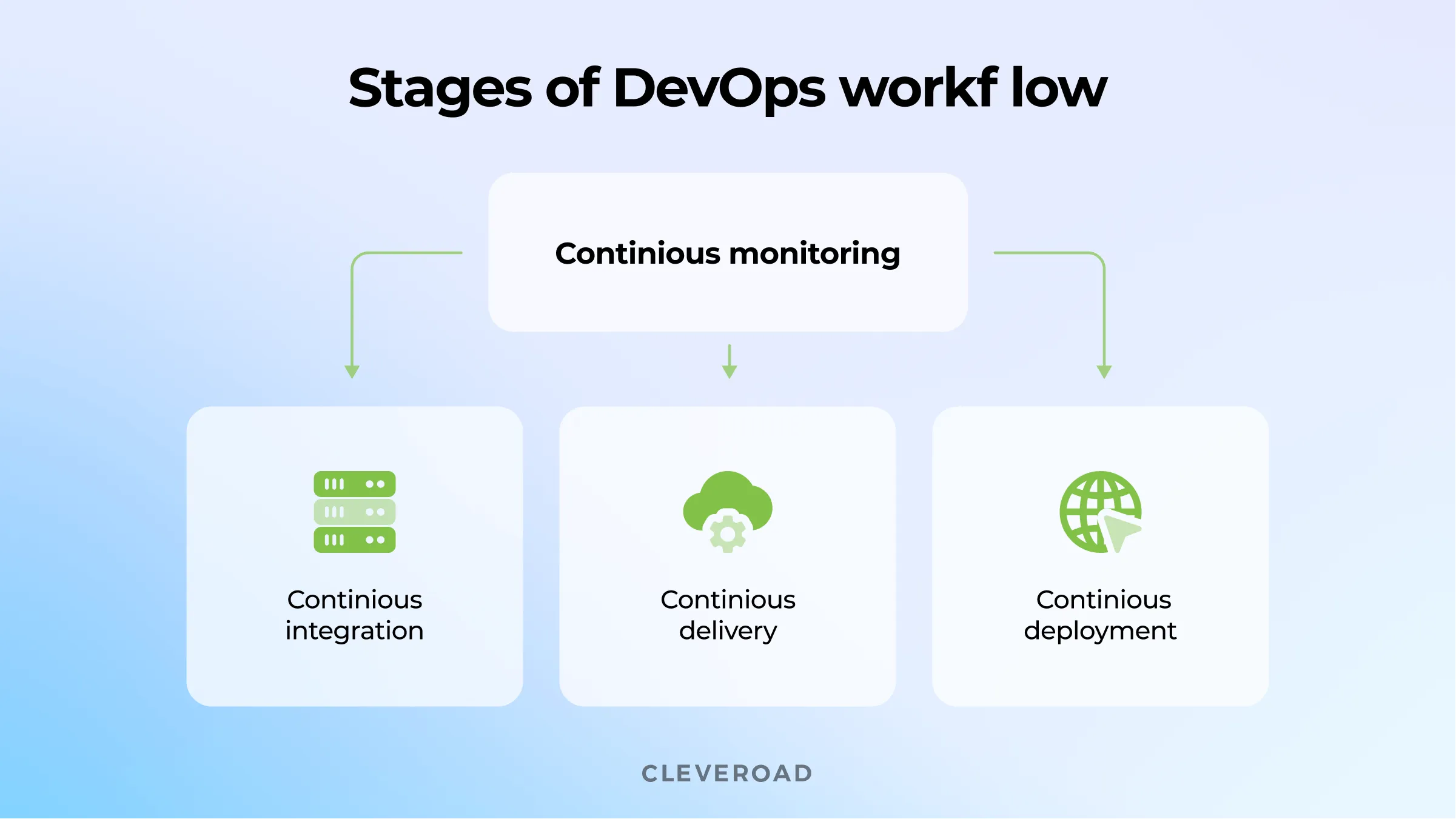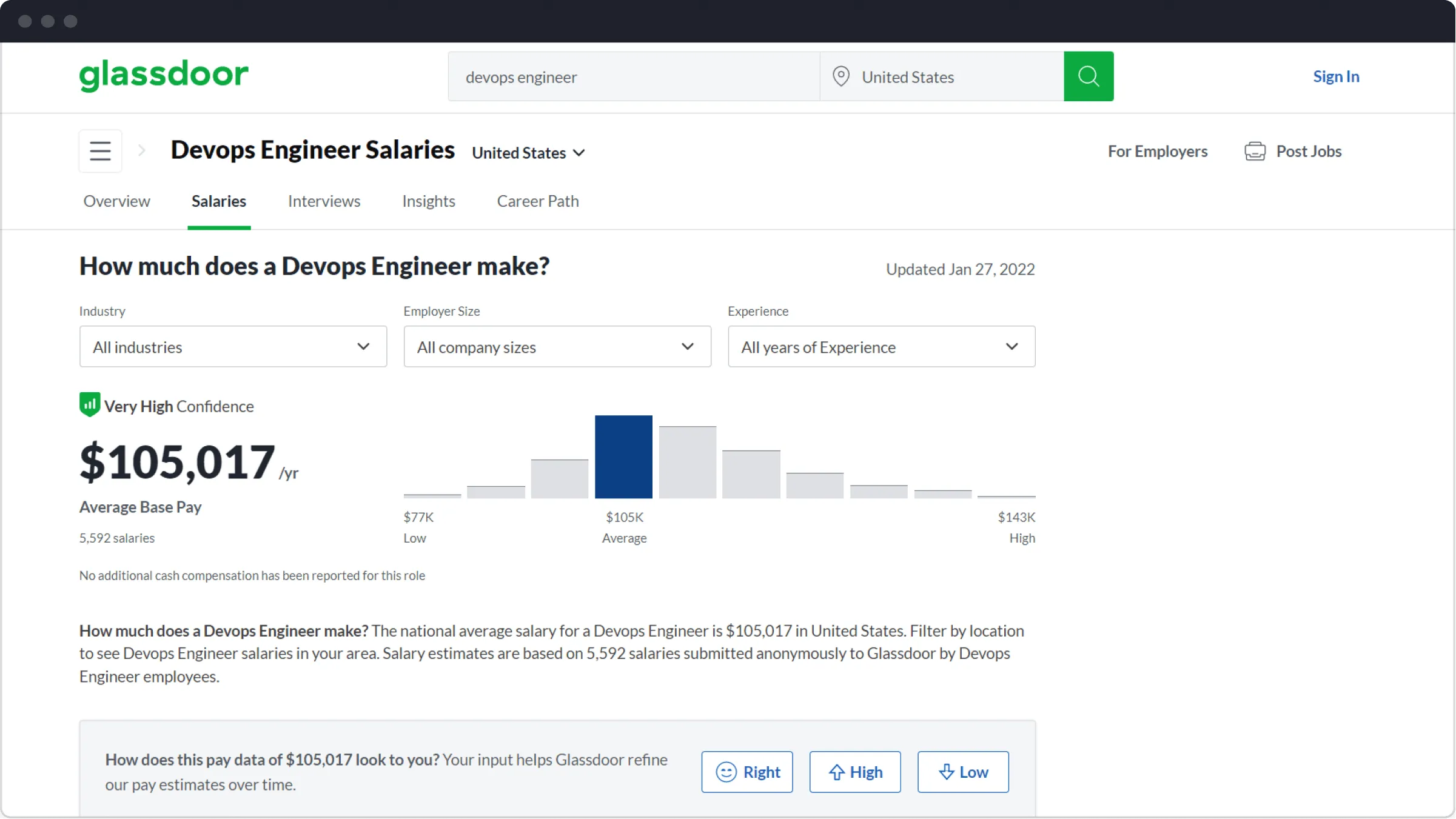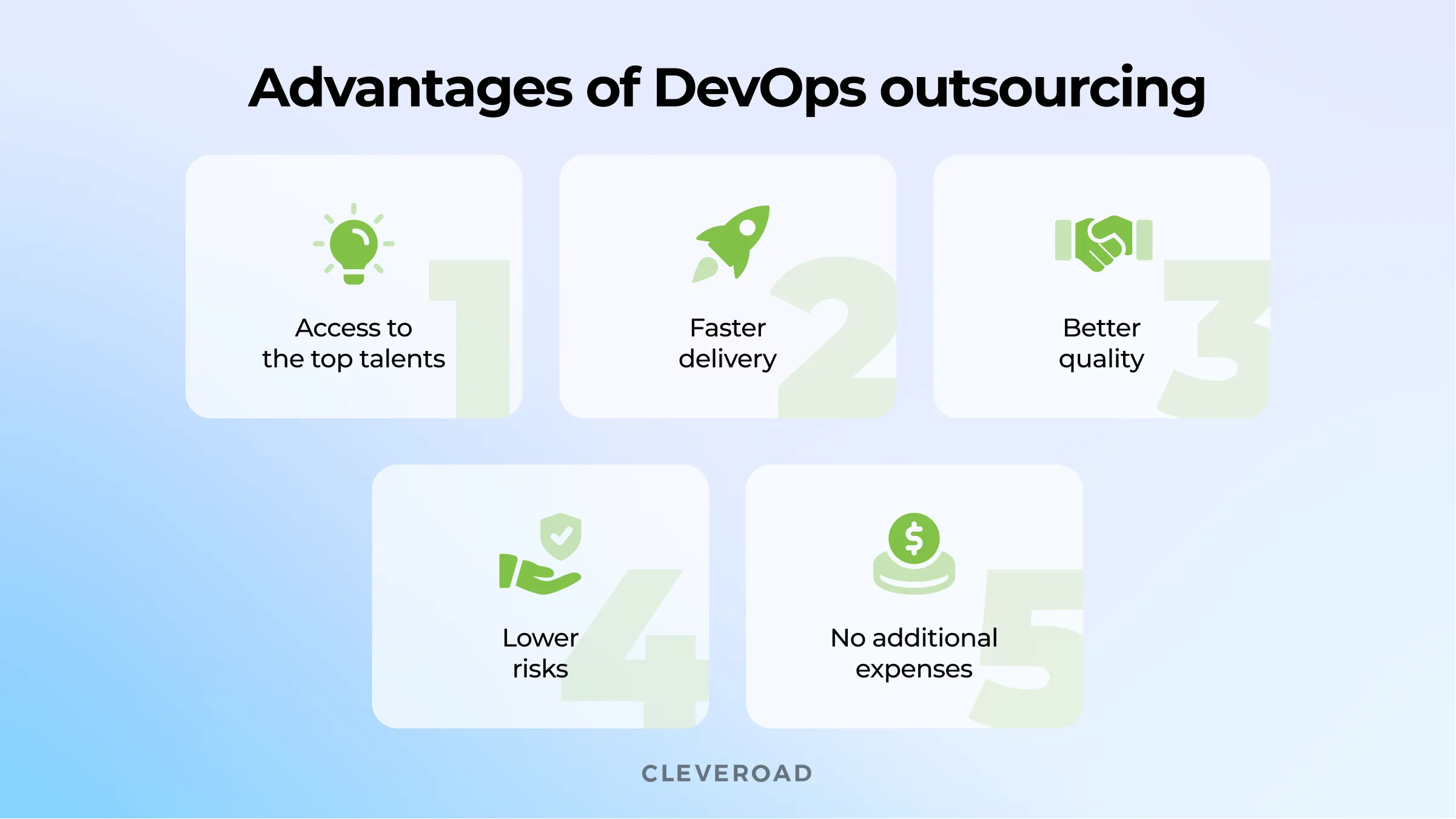DevOps As a Service: How It Works And Why Startups Should Outsource?
Updated 18 Jun 2023
9 Min
3062 Views
Startups push to deliver their projects today – or someone else may take the idea tomorrow. They are constantly looking for new tactics to make the development go more smoothly and faster. And DevOps practices are often on top of the list.
Best DevOps practices shorten the gap from crafting an idea to product release, and it looks like a winning solution for any business.
So how does DevOps work? What does it bring to product delivery? And, finally, where to hire DevOps engineers or consultants at rates a startup can afford? Let’s figure out.
How DevOps Works
First, let’s clarify: DevOps is not a job title nor a team’s name. It's a set of practices to ensure continuous integration into production.
DevOps practices are all about software deployment, operations, and addressing the gap between developers and the IT operations team. So it’s the job for a DevOps engineer to identify the right tools, set processes, and automate the code flow from development to production.
In turn, the development process goes faster, is more accurate and cost-effective. With fewer bugs in the delivered version.

What is DevOps and how it works
So, why do we need DevOps? In short, for faster delivery and better productivity.
As the State of DevOps Report shows, companies that work with DevOps expect:
- Faster product delivery;
- Higher flexibility while dealing with different apps, services or components;
- Fewer security issues;
- Lower chance of change failure;
- Better reporting of metrics due to automated systems.
DevOps have a specific background in which the three pillars are administrating, networks, and security. These are the domains an IT specialist should get experienced in before rushing to DevOps.
DevOps Process Flow
When we're talking about the DevOps process, we mean an efficient one. But how do companies reach this state of operations?
Want a deeper insight into successful project delivery and how to control it?Check our guide for a detailed overview!
DevOps workflow is all about agility and automation. Its every phase focuses on closing the gap between development and operations.
There are four continuous stages of DevOps workflow:
- Integration.
- Delivery.
- Deployment.
- Monitoring.
Let’s check each stage in more detail.
Integration
Integration practice is common in the DevOps process flow. Developers merge their code changes in a shared repository, and these updates get tested automatically.
Continuous integration (CI) ensures that up-to-date code is available for developers anytime. This helps to prevent costly delays by allowing a few devs to work on the same source code. Without any need to wait to integrate separate sections all at once on the release day.
Delivery
Continuous delivery (CD) is the second logical step of the DevOps process. During this stage, all code changes are built, tested, and packaged for release automatically. The goal is to release updates quickly and sustainably.
CD automates the release process, and engineers deliver new builds just by hitting a button.
Deployment
Continuous deployment is an automated version of delivery with no manual intervention. In the process, every validated change is automatically released to users.
It replaces scheduled releases with more frequent and smaller ones. In turn, developers get more accurate user feedback much faster. But for the continuous deployment to run well, companies should have a reliable automated testing environment (starting with CI and CD will help with getting there).
Monitoring and Feedback
undefined
Finally, the team should have tools to monitor and get feedback on the products and systems. Again, the majority of the monitoring process should go automatically and constantly provide feedback.
This process will help IT operations to identify issues and alert developers instantly. Continuous feedback ensures security and system reliability, along with agile responses to arising issues.

DevOps process flow
DevOps As a Service
While some businesses boast having DevOps engineers on their teams, not everyone can implement DevOps practices and principles the right way. That’s why many IT companies stick to DevOps as a Service (DaaS) concept and offer it to their clients.
How does it work? DevOps engineers deal with implementing DevOps methodology and fitting it to the existing infrastructure and customers' requirements. These services are fully customizable for each client and project.
Also, DaaS covers the transfer of the DevOps infrastructure into the cloud. IT firms that offer DevOps as a service assess the company's existing practices, launch cloud migration, and provide the tools to manage delivery pipeline in the cloud.
Generally, DaaS includes:
- Implementing cloud services;
- Development and production automation;
- Carrying out recovery plans;
- Cloud-to-cloud migration;
- Dockerizing and app-building.
As we’ve said, each project is unique and requires a personalized approach. So clients and DevOps service providers talk through the scope of work and agree on services on a case-by-case basis.
Here, at Cleveroad we offer the following DevOps outsourcing services:
Creating/adjusting/supporting/optimizing continuous integration and code delivery tools (Jenkins, Bamboo)
Interacting with Version Control Systems (Gitlab, Github, Bitbucket);
Linux/Windows servers administrating
Processes automation by creating scripts or using specific technologies like Ansible
Cloud platforms administrating (AWS)
Optimization of cloud IT-infrastructure according to the economic characteristics, management centralization or security aspects
Implementing a technology into a company's IT processes (like containerization (Docker) of any software running on one or a few servers)
Why Consider DevOps Outsourcing For a Startup?
Companies that are looking for software development services have two reliable options – go local or hire offshore specialists.
Check our full comparison of In-House vs. Outsourcing services and choose the software practice to follow.
Same with DevOps engineers. But local services are often expensive, especially in North America, and Australia. In turn, lots of startups can’t afford to hire qualified local engineers.
At the same time, offshore destinations offer a good quality-price ratio and lots of available specialists.
Here are the top 3 reasons why we need DevOps outsourcing:
1. Access to the senior engineers
When it comes to DevOps, experienced engineers will cost you a ton. According to Glassdoor, the average base pay of DevOps engineers in the US is $105,017/yr. And it’s is often quite a sum for a startup.

The average pay of DevOps engineers in the US
Outsourcing companies that offer DevOps as a service have a well-established recruitment process and provide the most experienced specialists. Plus, they offer more than affordable pricing. (We’re going to check DevOps outsourcing hourly rates in the next part of the article).
Besides, if you hire an experienced engineer, you'll be getting service from the very first day. No need to spend time and money on gathering the team and training.
Also, top engineers are often engaged in several projects in various domains. That’s a great opportunity to improve their experience and stay informed of the new tools and approaches.
Finally, when you have various DevOps skills at your disposal, you can involve less experienced engineers in general tasks and delegate top specialists to the most complicated ones.
2. Faster delivery and better products
DevOps outsourcing does work when it comes to shorter development cycles and ensuring continuous testing and deployment.
Companies that provide DevOps as a service accept the culture and collaboration approach. Such teams are way ahead; they are cross-functional and productive.
But it’s not just the corporate culture that makes the team work seamlessly synchronized. Offshore companies provide their engineers with the up-to-date infrastructure, services, and tools.
3. Lower risks and no additional expenses
A remote team of DevOps consultants often takes financial risks on themselves. You don’t have to pay taxes, buy hardware or software licenses, rent an office, and make a workplace comfortable for an engineer. You pay only for the job done and nothing more.
By outsourcing DevOps services to an experienced team, you can concentrate on growing your business and delivering more value to customers. Without worrying about product development, monitoring, or maintenance – it'll just work.
So why outsource DevOps? Because of:
- Access to a pool of talents.
- Shorter development cycles with better quality.
- Lower risks and no additional expenses.

Main benefits of DevOps outsourcing
Outsourcing Destinations And Costs
Of course, offshore pricing is not universal. The costs vary depending on location and the level of DevOps engineers.
Project complexity is another factor that influences the cost. For instance, you may need to migrate your system to the cloud or build a new infrastructure from scratch. Or upgrade the current environment. The complexity levels of these tasks are not the same, and so isn’t the cost.
As we’re talking about DevOps as a service, let’s review worldwide hourly rates provided by Clutch and GoodFirms.
- North America: $100 - $149/hr
- Australia: $100 -$149/hr
- Western Europe: $100 - $149/hr
- Asia: $49-100/hr
- Eastern Europe: $25 - $49/hr
- India: < $25/hr
Sure, you'll pay more for hiring engineers from the USA or the UK than from Germany or Ukraine. But it doesn't mean that the first two counties provide better services.
Ukraine is a great outsourcing destination! Take a look at our 'Reasons And Steps To Outsource Software Development To Ukraine' explanation.
Here's a tip: ask a few outsourcing companies to estimate your project and compare prices. But don't tie to them too much and mind the level of qualification they can offer.
Hire DevOps At Cleveroad
Cleveroad software development team has a considerable expertise in providing a great diversity of IT-related services and custom-built software solutions. They allow startups and businesses of any scale optimize workflow efficiency, solve industry-related issues, and help to gain competitive advantages.
Our partners are ensured with the following list of benefits when choosing cooperation with us:
- An utter team of result-oriented DevOps engineers with an in-depth experience
- On-demand services: custom software development and updating, legacy systems’ modernisation
- A cutting-edge tech stack to deliver state-of-art software
- A comprehensive consultation from our Project Managers regarding your project
Cleveroad team will eagerly provide you with DevOps services, so don't hesitate in contacting us.
DevOps practices are all about software deployment, operations, and addressing the gap between developers and the IT operations team. DevOps engineer identifies the right tools, set processes, and automate the code flow from development to production.
There are four continuous stages of DevOps workflow:
- Integration
- Delivery
- Deployment
- Monitoring
With DevOps, companies receive:
- Faster product delivery;
- Higher flexibility while dealing with different apps, services or components;
- Fewer security issues;
- Lower chance of change failure;
- Better reporting of metrics due to automated systems.
Reason to outsource DevOps are:
- Access to a pool of talents.
- Shorter development cycles with better quality.
- Lower risks and no additional expenses.
DevOps have a specific background in which the three pillars are administrating, networks, and security. These are the domains an IT specialist should get experienced in before rushing to DevOps.
As we’re talking about DevOps as a service, let’s review worldwide hourly rates provided by Clutch and GoodFirms.
North America: $100 - $149/hr Australia: $100 -$149/hr Western Europe: $100 - $149/hr Asia: $49-100/hr Eastern Europe: $25 - $49/hr India: < $25/hr

Evgeniy Altynpara is a CTO and member of the Forbes Councils’ community of tech professionals. He is an expert in software development and technological entrepreneurship and has 10+years of experience in digital transformation consulting in Healthcare, FinTech, Supply Chain and Logistics
Give us your impressions about this article
Give us your impressions about this article
Comments
1 commentsHello Team, Hope doing well!! Your composition is really great and useful content about DevOps. It will help is a lot! Thanks for sharing this data!!!